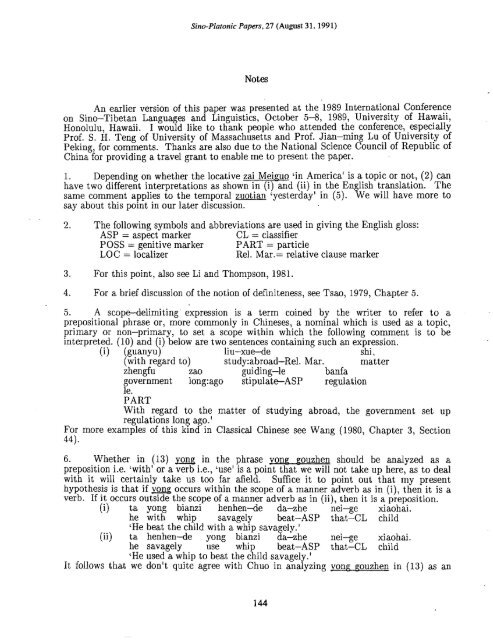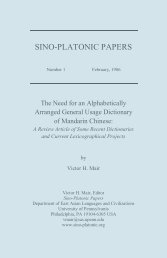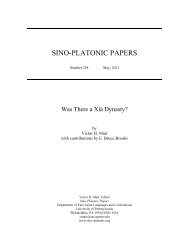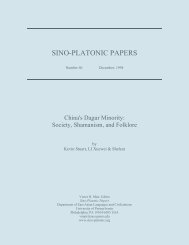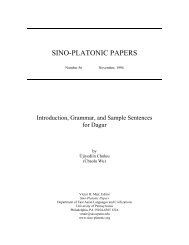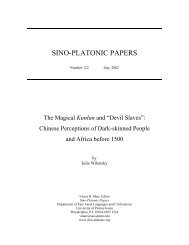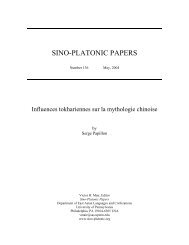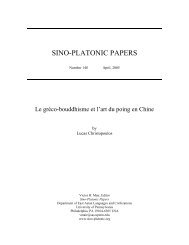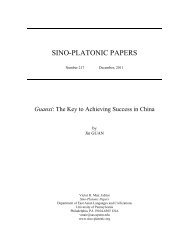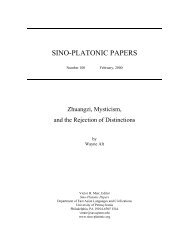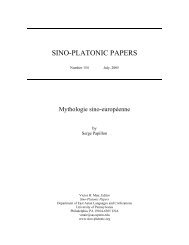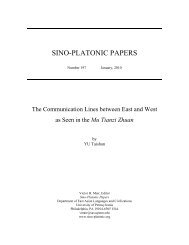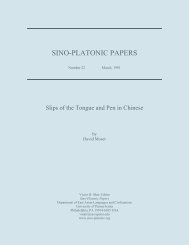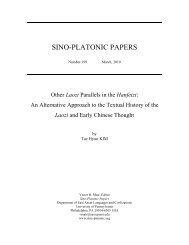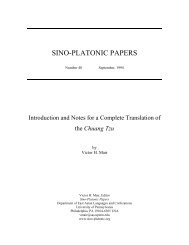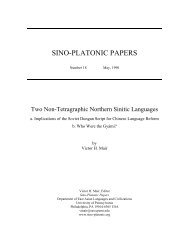Essays on Writing and Language in Honor - Sino-Platonic Papers
Essays on Writing and Language in Honor - Sino-Platonic Papers
Essays on Writing and Language in Honor - Sino-Platonic Papers
You also want an ePaper? Increase the reach of your titles
YUMPU automatically turns print PDFs into web optimized ePapers that Google loves.
S<strong>in</strong>o-Plat<strong>on</strong>ic <strong>Papers</strong>, 27 (August 3 1, 199 1)<br />
Notes<br />
An earlier versi<strong>on</strong> of this paper was presented at the 1989 Internati<strong>on</strong>al C<strong>on</strong>ference<br />
<strong>on</strong> S<strong>in</strong>o-Tibet an <strong>Language</strong>s <strong>and</strong> L<strong>in</strong>guistics, October 5-8, 1989, University of Hawaii,<br />
H<strong>on</strong>olulu, Hawaii. I would like to thank people who attended the c<strong>on</strong>ference, especially<br />
Prof. S. H. Teng of University of Massachusetts <strong>and</strong> Prof. Jian-m<strong>in</strong>g Lu of University of<br />
Pek<strong>in</strong>g, for comments. Thanks are also due to the Nati<strong>on</strong>al Science Council of Republic of<br />
Ch<strong>in</strong>a for provid<strong>in</strong>g a travel grant to enable me to present the paper.<br />
1. Depend<strong>in</strong>g <strong>on</strong> whether the locative zai Mei~uo '<strong>in</strong> America' is a topic or not, (2) can<br />
have two different <strong>in</strong>terpretati<strong>on</strong>s as shown <strong>in</strong> (i) <strong>and</strong> (ii) <strong>in</strong> the English translati<strong>on</strong>. The<br />
same comment applies to the temporal zuotian 'yesterday' <strong>in</strong> (5). We will have more to<br />
say about this po<strong>in</strong>t <strong>in</strong> our later discussi<strong>on</strong>.<br />
2. The follow<strong>in</strong>g symbols <strong>and</strong> abbreviati<strong>on</strong>s are used <strong>in</strong> giv<strong>in</strong>g the English gloss:<br />
ASP = aspect marker CL = classifier<br />
POSS = genitive marker PART = particle<br />
LOC = localizer Rel. Mar.= relative clause marker<br />
3. For this po<strong>in</strong>t, also see Li <strong>and</strong> Thomps<strong>on</strong>, 1981.<br />
4. For a brief discussi<strong>on</strong> of the noti<strong>on</strong> of def<strong>in</strong>iteness, see Tsao, 1979, Chapter 5.<br />
5. A scope-delimit<strong>in</strong>g expressi<strong>on</strong> is a term co<strong>in</strong>ed by the writer to refer to a<br />
prepositi<strong>on</strong>al phrase or, more comm<strong>on</strong>ly <strong>in</strong> Ch<strong>in</strong>eses, a nom<strong>in</strong>al which is used as a topic,<br />
primary or n<strong>on</strong>-primary, to set a scope with<strong>in</strong> which the follow<strong>in</strong>g comment is to be<br />
<strong>in</strong>terpreted. (10) <strong>and</strong> (i) below are two sentences c<strong>on</strong>ta<strong>in</strong><strong>in</strong>g such an expressi<strong>on</strong>.<br />
liu-xue-de shi ,<br />
'i' [%:tgiard to) study:abroad-Rel. Mar. matter<br />
zhengfu zao gui d<strong>in</strong>g-le banfa<br />
government l<strong>on</strong>g: ago stipulate-ASP regulati<strong>on</strong><br />
le.<br />
PART<br />
With regard to the matter of study<strong>in</strong>g abroad, the government set up<br />
regulati<strong>on</strong>s l<strong>on</strong>g ago. '<br />
For more examples of this k<strong>in</strong>d <strong>in</strong> Classical Ch<strong>in</strong>ese see Wang (1980, Chapter 3, Secti<strong>on</strong><br />
44).<br />
6. Whether <strong>in</strong> (13) y<strong>on</strong>g <strong>in</strong> the phrase y<strong>on</strong>e: gouzhen should be analyzed as a<br />
prepositi<strong>on</strong> i.e. 'with' or a verb i.e., 'use' is a po<strong>in</strong>t that we will not take up here, as to deal<br />
with it will certa<strong>in</strong>ly take us too far afield. Suffice it to po<strong>in</strong>t out that my present<br />
hypothesis is that if y<strong>on</strong>g occurs with<strong>in</strong> the scope of a manner adverb as <strong>in</strong> (i), then it is a<br />
verb. If it occurs outside the scope of a manner adverb as <strong>in</strong> (ii), then it is a prepositi<strong>on</strong>.<br />
(i) ta y<strong>on</strong>g bianzi henhen-de da-zhe nei-ge xiaohai.<br />
he with whip savagely beat-ASP that-CL child<br />
'He beat the child with a whip savagely.'<br />
(ii) ta henhen-de y<strong>on</strong>g bianzi da-zhe nei-ge xiaohai.<br />
he savagely use whip beat-ASP that-CL child<br />
'He used a whip to beat the child savagely.'<br />
It follows that we d<strong>on</strong>'t quite agree with Chuo <strong>in</strong> analyz<strong>in</strong>g g<strong>on</strong>g eouzhen <strong>in</strong> (13) as an


